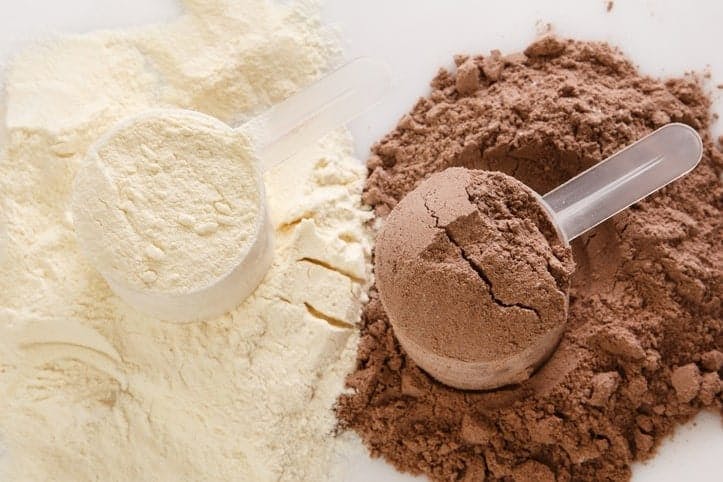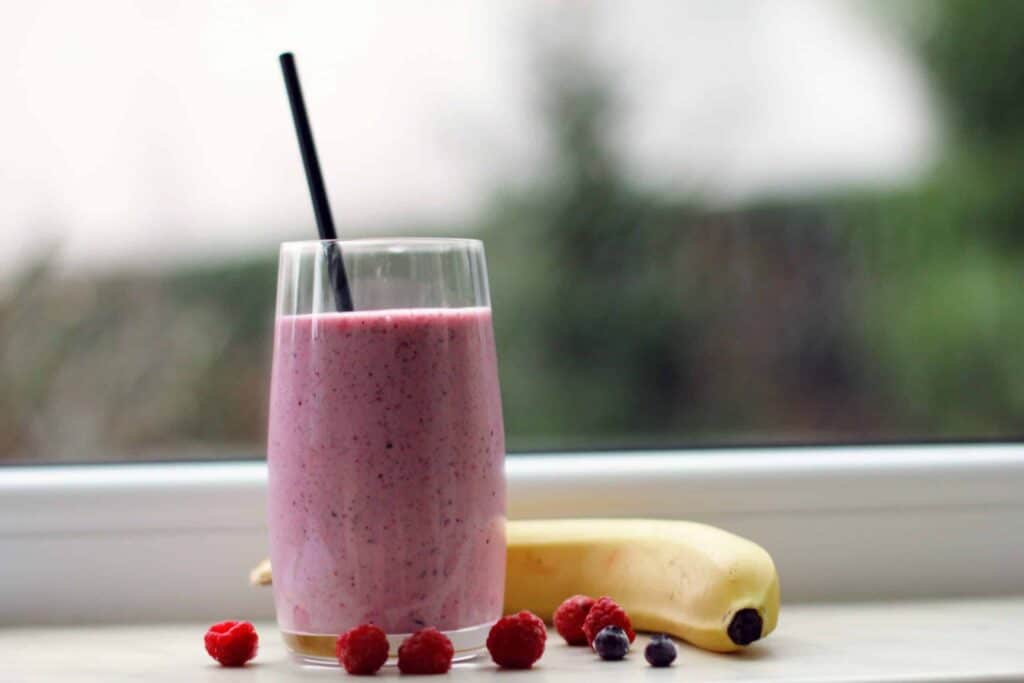


Find foods you can eat.
Choosing a Low FODMAP Protein Powder
Published on February 23, 2021Introduction to Low FODMAP protein powders
Protein powders are great after a long workout. They’re also a way to give a protein boost to your favorite smoothies to help you feel full longer. Whatever your reason for choosing protein powders, you have to be especially cognizant of ingredients when following a Low FODMAP diet. Let’s dive into choosing the Low FODMAP protein powder that works best for you (and your gut!). As always, the Fig app is a great way to find foods like protein powder that are Low FODMAP.
Different Types of Protein Powder
You’re probably well aware that there are plenty of options when it comes to choosing a protein powder both in terms of the protein source (animal vs. plant) and protein brand. Let’s start with protein sources below.
Animal-Based Protein Powders
Whey Protein
There are two different types of whey protein: whey protein isolate and whey protein concentrate. Both are derived from dairy, but they vary in lactose content. Whey protein isolate typically has minimal to no lactose content and is generally considered safe on a low FODMAP diet. Whey protein concentrate, however, may contain varying levels of lactose and should only be consumed if the product is explicitly labeled as “lactose free.”
Some whey protein and milk protein products may also contain the lactase enzyme which eases lactose digestion. These products would also be suitable for a low FODMAP diet, assuming they don’t contain other high FODMAP ingredients.
Remember that the low FODMAP diet is not a dairy free diet. Many dairy products are low FODMAP (butter, aged cheeses, lactose-free milk, whey protein isolate, etc.) while others are high FODMAP (milk, many fresh cheeses, etc.).
Egg Protein
Egg protein powders are derived from eggs which do not contain FODMAPs. Remember that FODMAPs are carbohydrates, so foods that primarily contain fat and protein, like eggs, are likely very low in or free from FODMAPs. When making an egg-based protein powder, the yolk is typically removed and the egg white is the base of the product. Egg protein powders are a good choice while following a low FODMAP diet.
Collagen Protein
Collagen protein is a small protein particle derived from animal sources and has been growing in popularity due to claims of glowing hair, skin, and nails, healthy joints, and increased bone strength. But is this new fad protein safe while following a low FODMAP diet? The answer is yes. Collagen protein does not contain lactose and is generally dairy free. Collagen protein is okay to include in your low FODMAP diet. However, it is important to note that despite all of its health claims, collagen protein is not a complete protein, so it may not be your best post-workout choice for muscle building.
Plant-Based Protein Powders
Rice Protein
Rice protein powder, which is typically made from brown rice as it contains a bit more protein than white rice, is a great low FODMAP and vegan protein source. Rice protein is also gluten free for those with Celiac disease (though be sure to check the label to verify there has not been any cross-contamination during processing).
Pea Protein
Pea protein powder is somewhat controversial when it comes to its FODMAP content. Monash University and FODMAP Friendly have both certified products that are made with pea protein powder; however, testing has also shown that FODMAP content of pea protein may vary. When choosing a pea protein, choose a product that has been lab tested and verified to guarantee the low FODMAP content.
Soy Protein
Soy protein powder has not officially been tested by Monash University or FODMAP Friendly, so it is difficult to know the actual FODMAP content of these products. Soy milk that is made strictly from soy protein or soy protein isolate is low FODMAP, so protein powders made from these same proteins may also be low FODMAP.
To be safe, avoid soy based protein powders during the elimination phase of the low FODMAP diet. However, you can always test your own individual tolerance level to these proteins by starting with small portion sizes and monitoring your symptoms. As a side note: the ingredient “soy protein isolate” is likely to be lower FODMAP than an ingredient just labeled as “soy protein.”
Hemp Protein
While hemp protein has not been individually tested by Monash University or FODMAP Friendly, there are some certified Low FODMAP protein powders that contain hemp protein such as this one from Casa de Sante.
Hemp seeds have been tested for FODMAP content by Monash University and do have a low FODMAP portion size, so hemp protein powders may also have a low FODMAP portion size. Similar to soy protein, if you want to be absolutely sure, only choose products that are lab tested and verified as low FODMAP. However, you can always test your individual tolerance level by starting with a small serving and monitoring your symptoms.

Common High FODMAP Ingredients
Even if you choose one of the generally safe protein sources above, it is possible that other high FODMAP ingredients have been added to the powder. Common high FODMAP ingredients found in protein powders include:
- Sugar alcohols (sorbitol, mannitol, xylitol, maltitol, and isomalt)
- Chicory root fiber or inulin
- High fructose corn syrup or glucose-fructose
- High FODMAP fruits
- Dried fruits
- Fructose
- Honey
- Agave
If you find any of these ingredients in a product, it is recommended to avoid that product during the elimination phase of the diet. Fig’s Phone App is a super easy way to check if products at the grocery store are low FODMAP. You can also tell Fig which grocery stores you shop at, and Fig will show you every single low FODMAP product at that store.
Choosing the Right Brand of Protein Powder
Now that you know the sources of low FODMAP protein, let’s choose the right brand. Below is a list of protein powders that have been certified low FODMAP. I’ve also included a list of powders that are likely low FODMAP based on their ingredients.
The following protein powders have been certified as low FODMAP by either Monash University or FODMAP Friendly:
- Casa de Sante
- Stellar Labs Nutrition
- Vitessence Pulse 1803 Organic Pea Protein
- Three Arrows Collagen Peptides
The following protein powders have NOT been certified but are likely Low FODMAP based on current ingredients:
- Source Naturals Brown Rice Protein Powder
- Naked Nutrition Brown Rice Protein Powder
- Naked Nutrition Egg White Protein Powder
- Optimum Nutrition Gold Standard 100% Whey Protein
- Jay Robb Egg White Protein Powder
- Isopure Whey Protein Isolate – Unflavored
- Vital Proteins Collagen Peptides
You can also find Low FODMAP protein powders and where to buy them with Fig’s free phone app. This is an especially helpful option if you have other dietary needs like gluten free, food allergies, vegan and more.
In Summary
Like all foods, some protein powders are low FODMAP while others are high FODMAP. It is important to put on your detective hat when reading food labels to ensure you choose the powder that is right for you.
You can always use the Fig App to find low FODMAP products at your favorite grocery stores.
 How to Find a Low FODMAP Bread
How to Find a Low FODMAP Bread Understanding Low FODMAP serving sizes
Understanding Low FODMAP serving sizes